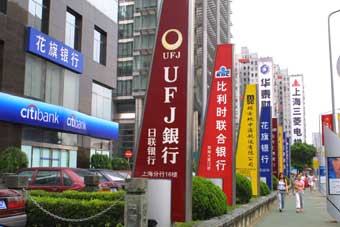New US Treasury Secretary Henry Paulson will lobby for more foreign
competition against China's cossetted banks when he visits the country next
month, an official said.

Pedestrians walk past billboards
of foreign banks in a street in Shanghai in this October 15, 2004 file
photo. China's banking regulator says nine Chinese banks introduced
foreign strategic investors and another nine are in negotiation with
potential foreign buyers.
[newsphoto] |
Treasury spokesman Tony Fratto noted that China, under its commitments as a
World Trade Organisation member, has until the end of the year to unveil
proposals on reform of its heavily protected financial sector.
"His (Paulson's) view is that it is in countries' interest to open up their
financial sector," Fratto told reporters.
The spokesman declined to say when the former Goldman Sachs boss would head
to China, but confirmed that his trip would include a stop in Singapore for a
meeting of Group of Seven finance ministers.
The G7 ministers are set to meet on the margins of the annual meetings of the
International Monetary Fund and World Bank, which this year take place in
Singapore on September 19-20.
Paulson is likely to echo the message of his predecessor John Snow, who on a
tour of China last October said that Beijing was offering "encouraging" noises
about the need to bring in outside expertise for its financial sector.
The Treasury is pressing for foreign banks, insurers and brokers to be
allowed to open up multiple branches in China, and for caps on foreign ownership
of Chinese financial institutions to be scrapped.
"Longer term we all want the renminbi (yuan) to be traded in a more competitive,
open marketplace," Paulson told the CNBC network on August 11.
"To get there we need their financial system to be open and open to
competition and then of course longer term, China needs to make the transition
from an export-driven economy to one that consumes more," he said.
The Treasury spokesman said that Paulson "brings a wealth of experience" to
the financial debate, having been the chief executive of Goldman Sachs before he
replaced Snow in July.
Paulson knows China as well as any holder of his office, having visited the
country upwards of 60 times since 1990 when he was at the Wall Street titan.
Along with retail banking giants such as Citigroup, investment banks like
Goldman Sachs are keen to grab a bigger slice of China's financial industry.
Chinese banks, while saddled with bad loans, are also groaning with cash from
companies' export earnings. That cash, experts argue, gets directed all too
often to unproductive domestic industries.
"The pace of change in international finance, especially in recent years,
it's just going at light speed. For countries to try to develop a home-grown
banking system is difficult, inefficient and time-consuming," Fratto said.
"It makes a great deal of sense that if you can welcome in world-class
financial services overnight, that would have an impact on your economy and help
to better allocate capital in your domestic economy," he said.